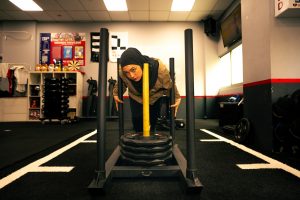Top image: Zachary Tang/Rice File Photo
All names have been changed
Standing half a head over me, dressed in black, 20-year-old Hector appeared the furthest from anything approximating vulnerability. The lanky teenager leaned forward in his chair while avidly recounting memories of his absent father and over-controlling mother. I could not discern whether he was particularly enthusiastic in sharing about his family with a complete outsider or just generally upbeat in his conversations.
Yet a question about his brother prompted an immediate pause. The incessant flow of words came to a jarring halt. The silence lasted several seconds. When Hector resumed, the words came out haltingly, the conversation forced rather than spoken.
“For most people, bullies come from school. I had those too. But the biggest one was the one waiting for me at home.”
Despite his imposing stature and carefully constructed façade, Hector remains a 12-year-old boy suffering from the echoes of familial violence long past. For many others, the war rages on.
What the studies show
In a 2019 study, 89.9% of Singaporean college students with siblings had experienced physical and psychological sibling abuse within their lifetime, with 62.0 % of those interviewed having experienced such abuse within the past year alone.
For younger siblings, interactions with their older siblings disproportionately impact this development. These older siblings play multiple roles as their first peer, emotional rapport, and personal benchmark to gauge themselves against.
These initial stages of childhood development are the most crucial for defining every person’s personality, character, and eventual outlook on life.
But flip the coin, and we see how older siblings can similarly ostracise their younger siblings, reinforce negative familial experiences, and create feelings of inadequacy and fewer opportunities.
Because of this, familial abuse of younger siblings may occur either in more direct or indirect forms, whether physical, verbal, or psychological.
With aggressive older siblings, younger siblings are more likely to exhibit behavioural issues, perform poorly in school, and have fewer positive relationships with their peers.
With emotionally distant older siblings, younger siblings have a higher chance of internalising negative experiences from family issues and are at greater risk of suffering from depressive and anxiety-related disorders due to self-esteem and competence issues.

The role of casual violence
Hector’s older brother, Joseph, belonged to the former category. At first, he and Joseph were emotionally close, having to ride out the shared familial experience of financial concerns, constant inter-parental conflicts, and eventual divorce and separation.
Then, Hector’s brother had to take the brunt of the emotional damage from these ongoing issues, defining himself from young while struggling with the expectations of being the older child and older brother. Hector, four years his junior, was at the time constantly orbiting him like a satellite.
“I was at that age where I just desired to be liked by my brother. I felt like I wanted his approval because he was both around my age and older at the same time. When times were good, he was fun to be around and even accepting.”
However, when the time came for Joseph to “grow up”, Hector’s role in his older brother’s life changed from fellow companion to irritating liability. Rejecting the caretaking responsibilities placed upon him by his younger brother and resentful of his parent’s simultaneously dismissive and overdemanding attitude towards his role as the older sibling, he balled his frustrations into a fist and aimed it at Joseph.
“Every other day, after doing something fun, he would eventually get annoyed with me. It’d become something where he’d say, ‘You can’t do this, you can’t do that. And when I did it anyway, he would go quiet,” Hector recalled.
“Then he’d hit me.”
Hector retains many vivid memories of these interactions with Joseph. Whether it was playing with the family at the beach or hanging out together with Joseph’s friends, that silence signified the calm before the storm broke, the respite before the sharp and violent end to whatever enjoyment Hector was experiencing at that point. And it made him afraid of some things we take for granted.
“Whenever I sang along to songs on the radio, he’d just straight up say “you can’t sing”, and then I had to stop… every time. Nothing was done. It’s got to the point where now I’m too scared to sing anymore, whether in public or in my own house… I can’t anymore. Singing is too tied to my memory of my brother’s figure, always hitting me.”
The problem with such displays of physical violence is that they are quick and casual, playing into the traditional Asian archetypes of the older sibling’s authority.
Beyond the nonchalant “don’t do that” or “don’t hit him”, it remains very easy for Asian parents to stay indifferent or even give tacit approval of such acts, especially if they don’t result in significant injury and are done in response to what they perceive as the younger sibling’s inappropriate behaviour.
Heavier punishments such as the cane, the hanger or the belt are worse still, as they instil the view that familial authority should be backed by physical abuse or, in simpler terms, “might make right”.
Such solutions, though present, did not comfort Hector then. They certainly do not comfort him now.

The role of the inferiority complex
However, not all bullies are cut from the same cloth. While some left bruises with fists, others left tears with sneers.
19-year-old Janet had an older brother, Keith, who belonged to the psychological variety. Despite his presence with the rest of the family around the dinner table and being a mere two years older, he was distant and aloof from a young age. Yet, for every achievement or feat she performed, she remained haunted by the spectre of Keith’s shadow.
When she had first started Primary School, he was already in the Gifted Education Programme (GEP). While she was struggling to qualify for GEP, he enrolled in Raffles Institution through Direct School Admission. After she had qualified for Raffles Girls Secondary on her own merits, he was in RJC participating in medical internships while revising for his A levels.
For her, it was a competition that never seemed to end, a bar that was constantly being raised.
“All the attention was directed to him because when I was young, it was all about grades… My dad would try to go out of his way to arrange for internships, programmes and meets for my older brother. None of that was ever given to me.”
Outspoken yet incredibly self-absorbed, Keith dominated the conversations around the dinner table. His words came so fast that Janet had little chance to interject with her own opinions.
Worse still, every time she attempted to speak up, Keith cut her off. With little interest in the bread-and-butter topics of current events, politics, or science, she was forced to compete for something near and dear to her that Keith so consistently and nonchalantly gained: parental affection.
Facing a perpetual struggle of greater expectations and fewer resources, Janet exhibited textbook symptoms of atypical depression.
“It felt like there was this coalition he had with my parents, where I couldn’t understand what was going on… I felt like a bystander in these conversations. It wasn’t even about scoring points with our parents. It was just me trying to get a reaction from them because he was smart, and I was dumb.”
Differential treatment favouring older siblings and disadvantaging younger ones in parent-child conflict, discipline and affection have been linked to adjustment issues, resource dilution, and child stereotyping.
While likely acceptable in Western societies where alternative metrics of success are more available, the more traditional mindset of many Asian families often views youthful liberality as dangerous rebellion, estranging younger siblings from their families as a result.
In Janet’s case, it made her a stranger in her own home. “I felt that it was unsafe to share my negative feelings openly with my parents because I felt that my feelings, insecurities, and the things that would upset me, would be condemned by my family in the same way that they pushed away my ideas. All I needed was a safe space to talk.”
The worst times for Janet came when Keith did respond to her in familial conversations. Still, it was not enough for Keith to assert his dominance over her academically—he would shut down whatever she tried to do or whatever she hoped to be.
Beyond merely disparaging, his comments appeared undisputed because they were clothed in cold hard reality.
“He kept calling me fat. It seems like such a small thing when you take it out of context. But it wasn’t just that he said it, but it was how he said it. His metabolism was high, and mine was low. Or it was his diet, his lifestyle. Although my parents scolded him, no one told me I wasn’t fat. Once would have been an insult. But because it kept being said, I thought it must be true.”

Internalising insufficiency
Due to their junior position within the family, younger siblings are often ingrained with the stereotype that they are less academically competent, emotionally stable, or physically capable than their older siblings, ignoring the actual evidence of their own performance.
For Janet, she eventually accepted that not only was she necessarily academically worse off than her older brother, but that she was overall less than her older brother. The fact that Keith had made such callous remarks scarred her deeply. After all, they were facts, and facts could not be wrong.
On the other hand, Hector’s negative outlook came from a different source. As their parents generally left them to their own devices, the key conversations for him were the ones that the brothers had with their friends and the activities they participated together in.
For team activities, the brothers would pair up. And if they lost, the blame fell on Hector, regardless of what happened. From there, it only got worse and worse.
It started with a few negative comments and then became active oppression. Hector’s objections are met with silence as all his friends would stand on Joseph’s side.
Eventually, Hector was purposely excluded from certain activities altogether.
“One day, I just broke down. I remember my family asked me why I was crying so much about something that my brother said, and my friends told me they wouldn’t be affected if the same things were said to them. I always had to take it all in. I had no place to be vulnerable. Before I knew it, I was managing my emotions alone, the thoughts just popping into my head.”
While seemingly innocuous and childish, these comments and social behaviours significantly impact a child’s mental health growing up.
Ostracisation and peer victimisation, especially at a young age, can cripple its victims long into adulthood.
Left unchecked, such internalising behaviours have been empirically shown to increase the risk of depression, anxiety, low self-esteem, loneliness, and hopelessness.

The aftermath of years of sibling bullying
Struggling to find himself, Hector was picked on in school as well and had little support from either friends or family during this period. However, what it did teach him was to fend for himself, especially after he went through puberty.
Still, that transition brought its own set of problems. With his new height, build, and outward impression of maturity, Hector could easily get into clubs as a minor. This lead to him picking up drinking and smoking, losing his virginity early on at the tender age of 14, and becoming a playboy.
No matter how hard he tried, he couldn’t escape the fact that these vices left him empty and wanting. Eventually, he contemplated and attempted suicide.
“It might seem like a small thing now. But when you’re a kid, your emotional development comes from how you’re treated. I was always stuck in this small space. I was always rejected, embarrassed, and helpless. You never really leave that space. After a while, you want it all to stop.
For Janet, the pressure is in living up to the legacy Keith left behind in his wake. Still, this would prove to be an uphill task, no thanks to the pressure-cooker environment imposed by her parents and the lack of support and attention Keith had benefitted from.
As a result, Janet began to suffer from body dysmorphia. She could not stomach her food and became anorexic, having to be hospitalised several times.
“When no one dismisses the idea of you being called stupid or fat, it takes root in the back of your mind. And when you stare at yourself in the mirror after your classmates insult you, you no longer believe that you can change. You wonder ‘why bother?'”
Eventually, the pressure got to her. Despite qualifying for RJC with far higher scores than Keith, she would drop out of the A level track altogether after her first year. Janet struggled with her academic life and body image for years until late adolescence, when her older brother moved out of the house.
She felt that she only truly began recovery after she moved overseas to pursue greater freedom and independence.
Getting better—but not quite
Thankfully, Hector is in a better place now. Having recently reconnected with his older brother after being estranged for several years, Hector’s relationship with Joseph has improved dramatically over time.
While he is on somewhat better terms with Joseph, Hector has also gotten used to masking his frustrations with a smile. He admits to feigning confidence in the face of crippling anxiety.
He still struggles to shake off the blinders of his pessimistic outlook and the oppression chaining him to the past. Nonetheless, Hector is pushing himself to be a better person. Hector still raises his head to face each new day.
Both Janet and Hector chose to take their own steps, either toward or away from the persons that represented the oppression they faced in their childhood. Given the complex feelings that victims have towards their bullies, especially in the familial context, it isn’t easy to endorse any particular action as a step in the right direction.
Yet many remain in what is perhaps the worst position of all: standing absolutely still. The dinner table’s maze of inferiority complexes, conflict avoidance, and quick tempers remains both a haunting memorial for many and an ongoing battlefield for some.






